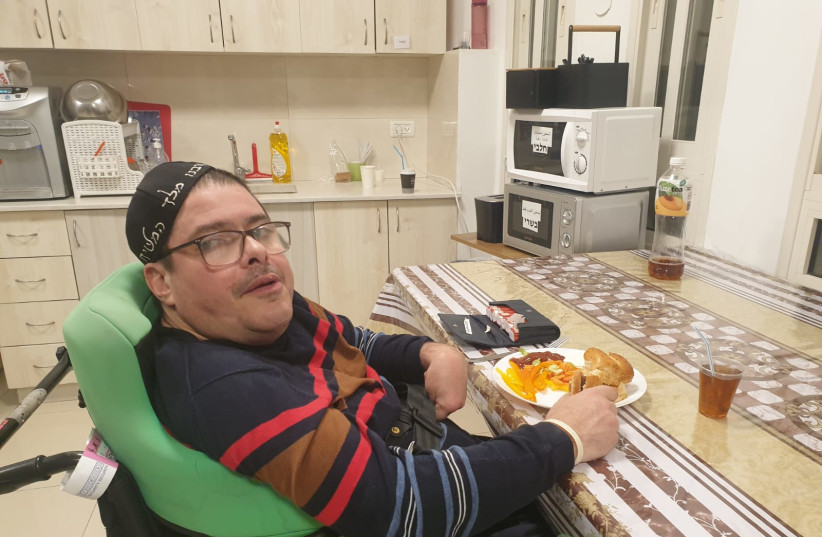Jacques Salam became the first special-needs immigrant to receive assistance in his integration into Israel from day one a few days ago, ever since a change in the procedure for accepting immigrants with disabilities kicked in.
A few months ago, the State of Israel corrected a longstanding omission and allowed people with special needs to prearrange their immigration and residence in the country. Until recently, new immigrants recognized in their country of origin as people with special needs (including deaf, hard of hearing, blind, visually impaired and/or mentally challenged) couldn’t begin their immigration process.
 Learn how to buy your home in Israel with confidence
Learn how to buy your home in Israel with confidenceSalam, who changed his name to Jacques Sellam, is not an ordinary immigrant; he is paralyzed in both legs as well as his left hand. After making aliyah from France, he changed his name to Hebrew: Yaakov Shalem.
Helping special needs immigrants make aliyah to Israel
In recent months, the problematic immigration protocol changed, making it possible for special needs immigrants and their families to prepare in advance the requirements for immigration.
In December, a joint initiative was established to push this forward, as well as insure integration post-aliyah.

This breakthrough will also enable those with disabilities to better understand the services and resources available to them immediately upon arrival and ease their acclimation accordingly.
The initiative is in cooperation with the Jewish Agency for Israel, Israel’s Welfare and Social Affairs, and Aliyah and Integration ministries, together with the Nefesh B’Nefesh and Qualita immigration organizations.
A press release in December noted that the joint initiative “will revolutionize the aliyah process for people with disabilities, enabling them to exercise their right to immigrate to Israel and more easily integrate into Israeli society.”
Ariel Kandel, CEO of the Qualita organization for aliyah from France, said on Sunday, “Yaakov’s emotional immigration was made possible thanks to the cooperation between all of the government officials and Israeli nonprofits.
“We have all worked together in order to fulfill Shalem’s dream of immigrating to Israel; a dream that seemed very far away when he was living in France, up until a few months ago.”
Ariel Kandel
“We have all worked together in order to fulfill Shalem’s dream of immigrating to Israel; a dream that seemed very far away when he was living in France, up until a few months ago,” Kandel said. “Upon his arrival, Yaakov was received with extraordinary warmth at the Kanfei Ruach community in Jerusalem. We hope that following the correction of the omission, many more Jews in the Diaspora will be able to fulfill their dream and immigrate to Israel.”
Qualita is holding a special fundraiser titled “Israel Charity,” intended for needy French Jews who cannot afford to immigrate. According to the organization, the COVID-19 pandemic significantly increased the number of immigrants in need of assistance, some of whom have become dependent on social services and donations.
“The money collected will help thousands of immigrants,” Kandel said.
Jewish Agency Chairman Maj.-Gen. Doron Almog is one of the main forces behind the change in government assistance to immigrants with special needs. Almog is the founder and chairman of the Adi Negev-Nahalat Eran rehabilitation village, which has become a model for the integration of people with disabilities.
“Yaakov’s story is a clear example of the importance of the agreement that the Jewish Agency signed with the Aliyah and Integration and Welfare ministries regarding the immigration of people with disabilities to Israel.”
Doron Almog
Almog told The Jerusalem Post on Sunday, “Yaakov’s story is a clear example of the importance of the agreement that the Jewish Agency signed with the Aliyah and Integration and Welfare ministries regarding the immigration of people with disabilities to Israel.”
Almog added that Shalem’s immigration “is an expression of our commitment to do everything in our power to enable people with disabilities to exercise their rights and live in Israel. Every immigrant faces many challenges upon arriving in Israel, all the more so when it comes to people with disabilities. As a society, we must do everything in our power to facilitate their absorption and give every oleh, no matter what their status is: certainty and security.”
 Sign up for our newsletter to learn more
Sign up for our newsletter to learn more 